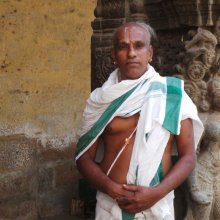Porul: 3 definitions
Introduction:
Porul means something in Hinduism, Sanskrit, Tamil. If you want to know the exact meaning, history, etymology or English translation of this term then check out the descriptions on this page. Add your comment or reference to a book if you want to contribute to this summary article.
Images (photo gallery)
In Hinduism
Natyashastra (theatrics and dramaturgy)
Source: Shodhganga: The significance of the mūla-beras (natya)Porul (matter) is the second part of the Tolkāppiyam, a source book on linguistic and grammatical study, social anthropology, psychology and cultural ecology, representing an important piece of Tamil literature.—The Tolkāppiyam deals with the grammar of literature and its conventions. This text has three parts and counts 1610 sutras. The three parts of it are eluttu (orthography), coll (etymology), and porul (matter) each with nine sections. Each division is called an atikāram. Tolkāppiyam, the most ancient Tamil grammar extant, was written around the 2nd century BC. The author of this book is Tolkappiyar, one of the twelve students of Agastya.
Porul-atikāram (treatise on grammar of love poetry) describes akam (people’s inner personal life), and puṟam (people’s external worldly life). Porul, in general, deals with the themes and forms of literature. Porul here means ‘that which is important in life’. It describes art forms, which are connected with people’s life.

Natyashastra (नाट्यशास्त्र, nāṭyaśāstra) refers to both the ancient Indian tradition (shastra) of performing arts, (natya—theatrics, drama, dance, music), as well as the name of a Sanskrit work dealing with these subjects. It also teaches the rules for composing Dramatic plays (nataka), construction and performance of Theater, and Poetic works (kavya).
Languages of India and abroad
Kannada-English dictionary
Source: Alar: Kannada-English corpusPoruḷ (ಪೊರುಳ್):—[noun] = ಪೊರಳು [poralu]2.
Kannada is a Dravidian language (as opposed to the Indo-European language family) mainly spoken in the southwestern region of India.
See also (Relevant definitions)
Starts with (+4): Porul-iyalpuraittal, Porul-purinul, Porul-uraialar, Porul-vayirpirivu, Porul-vilankavaittal, Porulacai, Porulakarati, Porulal, Porulan, Porulanantam, Porularai, Porulatikaram, Porulcey, Porulceyvor, Porulilakkanam, Porulincelvi, Poruliyal, Porulkol, Porulupatai, Porulurai.
Ends with (+58): Acaiyapporul, Akapporul, Alporul, Ankiyarporul, Aputrakaporul, Ara-nilaiporul, Aruporul, Ataikkalapporul, Ataiporul, Atamarnikapporul, Campantapporul, Cattiyapporul, Celvapporul, Cemporul, Ceyarkaipporul, Ceyporul, Cuttupporul, Ilporul, Inai-kotaiporul, Iraiccipporul.
Full-text (+591): Celvapporul, Ataiporul, Velipporul, Campantapporul, Valakkupporul, Tantapporul, Mukkiyapporul, Kurippupporul, Nal-vakaiporul, Atamarnikapporul, Kalaviyal, Kuttakaipporul, Kaunapporul, Porul-purinul, Maru-poruluvamai, Mulapporul, Narporul, Ara-nilaiporul, Porul-vilankavaittal, Karuttupporul.
Relevant text
Search found 5 books and stories containing Porul, Poruḷ; (plurals include: Poruls, Poruḷs). You can also click to the full overview containing English textual excerpts. Below are direct links for the most relevant articles:
Love in Tamil Poetry < [January-February, 1929]
'The Heroic Mother' < [December 1938]
Reviews < [April 1940]
Tiruvaymoli (Thiruvaimozhi): English translation (by S. Satyamurthi Ayyangar)
Pasuram 7.1.9 < [Section 1 - First Tiruvaymoli (Ul nilaviya)]
Pasuram 2.10.11 < [Section 10 - Tenth Tiruvaymoli (Kilar oli ilamai)]
Pasuram 1.1.7 < [Section 1 - First Tiruvaymoli (Uyarvu ara Uyar Nalam)]
Sivaprakasam (Study in Bondage and Liberation) (by N. Veerappan)
Kevala Avastha < [Chapter 3 - Understanding the Self]
Main stages of liberation < [Chapter 7 - Liberation]
Karya Avasthas < [Chapter 3 - Understanding the Self]
The Religion and Philosophy of Tevaram (Thevaram) (by M. A. Dorai Rangaswamy)
Chapter 5 - Tirukkalumalam (Hymn 58) < [Volume 3.1 - Pilgrim’s progress: to Arur]
Chapter 4 - Tamil and Religion < [Volume 4.1.2 - The conception of Paramanaiye Paduvar]
Chapter 2 - The cult of Atiyars (Adiyars) < [Volume 4.1.2 - The conception of Paramanaiye Paduvar]
Hindu Pluralism (by Elaine M. Fisher)
